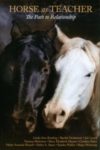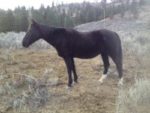The Difference between Holistic Herbal Medicine for Horses & Western Medicine
Note from Faye: This article does a great job of describing and summing up why we prefer to choose Herbal (or ‘natural’) medicine over Western (or ‘traditional’) medicine whenever possible. That is not to say Western medicine does not have it’s place, rather that we, whenever possible choose to treat our horses with natural, holistic and non-invasive methods ...
By: Zoe Dodds
Herbal Medicine uses remedies derived from plants to treat common illnesses. These herbs are dietary supplements that you can give to your horse in its raw form or dried, through teas (infusions), extracts, tinctures and oils or as part of a combined remedy. Herbal Medicine aims to not only treat the symptoms but to introduce improvements to your horse’s lifestyle and wellbeing.
horse in its raw form or dried, through teas (infusions), extracts, tinctures and oils or as part of a combined remedy. Herbal Medicine aims to not only treat the symptoms but to introduce improvements to your horse’s lifestyle and wellbeing.
Herbs have been used on people and animals for thousands of years across a range of cultures. Shamans, Medicine men and women, pharaohs, kings and field workers all knew the benefits of herbs on their people and animals. Some of the more common cultures to have used herbs on their horses were the native american indian tribes, the ancient greeks and the romany gypsies of Europe. Horses also have instinctively foraged on medicinal plants native to their grasslands gaining the necessary nutrition to heal and prevent illness.
Modern medicine is in fact foundered from the use and experimentation of thousands of years of herbal medicine knowledge. Veterinarian science and the development of pharmaceuticals has evolved directly from the accumulated wisdom of herbal history that has greatly benefited western medicine as we know it today.
So how do herbs work and how can we use them safely on our horses in the context of our modern world?
Firstly, lets make the distinction between herbal use and the development of pharmaceutical medicine. Many herbs contain constituents (medicinal properties) that when isolated and or duplicated synthetically in the case of pharmaceutical drugs, can be harmful to people or horses. This is how many herbs have been labelled as dangerous and their use restricted to the public.
When using the whole of a plant, the synergy of all the constituents within the herb act on the body together to create the greatest benefits to the body. Nature has endowed plants with a balance, which makes herbal medicine when used correctly a fantastic all-round remedy with little to no side effects. If a plant has therapeutic properties that can heal an infection, that plant will often also contain elements that will counterbalance any possible side effects. This is how herbal medicine differs from modern medicine. For example, birthwort can be taken when someone has a reaction to penicillin as it contains the same properties as penicillin without producing any of the adverse reactions. Traditional (allopathic) medicine is often a manmade re-creation of a herbal remedy but lacks the natural balance that prevents any harmful recourse.
 Herbs having been used traditionally for many thousands of years are well documented in old veterinary and herbal texts. Herbs are not quick fixes in the way that drugs can be but the philosophy of herbalism is to treat the whole horse by gently balancing and supporting health from the inside. The best ways to use herbs to help your horse are firstly in a preventative program if your horse has a predisposition to a specific complaint. Herbs can also be used to restore and tone a horse after illness and to nutritionally support your horse.
Herbs having been used traditionally for many thousands of years are well documented in old veterinary and herbal texts. Herbs are not quick fixes in the way that drugs can be but the philosophy of herbalism is to treat the whole horse by gently balancing and supporting health from the inside. The best ways to use herbs to help your horse are firstly in a preventative program if your horse has a predisposition to a specific complaint. Herbs can also be used to restore and tone a horse after illness and to nutritionally support your horse.
The power of herbs cannot be underestimated and it is preferable that a professional herbalist prescribes them to avoid unnecessary complications. Herbal remedies when used correctly are unlikely to produce extreme negative side effects however they can interfere with orthodox medicine so always consult your vet and herbal practitioner before use.
Each herb has a different strength and to follow directions is important. Generally the maximum dose added to a feed whether it is one herb or several (dried and chopped), is 1 cup. Powdered herbs of bark and roots are given as a teaspoon or tablespoon. One of the easiest ways to give your horse herbs is through an infusion. Simply poor boiling water over the herbs, cover with a secure lid and steep for 5-20 minutes. Cool and add 1-2 cupfuls to your horse’s feed.
Common sense has to be used when treating your horse with medicinal herbs, as some are toxic for horses and can have serious adverse reactions. Always stay within the recommended dosage, and before you begin any herbal treatment, ensure your horse’s condition is correctly diagnosed by a professional. When used in this way herbs can greatly enhance the quality of your horses life.
It is very important to note that human herbalism is not directly transferable to equine herbalism. Many herbs that are safe to use on humans can cause harm when used on horses. It is important to consult a qualified equine herbalist to instruct you on what herbs are suitable for your horse at any given time. Herbs can be powerful and it is best to use herbs that are classified as having a gentle action on the body.
If you see any reaction that is not comfortable for your horse, cease using the herb immediately. Also it is important to note that herbs can interact with pharmaceutical medicine, so it is important to consult with your vet or herbalist to ensure the combination of herbs you are giving is providing the best possible outcome.
Herbs are wonderful. You don’t need to be afraid of them. Simply be informed, and use them with the respect they deserve.
About Zoe
Zoe Dodds has a lifelong interest in Natural Health and Personal Development. A long term meditator and teacher, she has sought to empower others through understanding the world of nature and energy.
As a professional acupuncturist she is trained in a range of Oriental therapies; including Shiatsu Therapy, Cupping, Dietary Therapeutics, Sotai, Tui-na, Moxibustion, Gui Sha, Ryodoraku, Meridian Frequency Therapy, Scalp, Auricular and Cosmetic Acupuncture. Her trainings are in Classical, Zen and Barefoot styles of Shiatsu and all her qualifications are in both the people and equine fields of development. Zoe has further extended her studies to Herbs, Essences, Nutrition and a variety of complementary medicine modalities such as Aromatherapy and Homeopathy, that she applies to both people and horses.
Click here www.naturalhorsetherapies.com to learn more about Zoe and her work.


